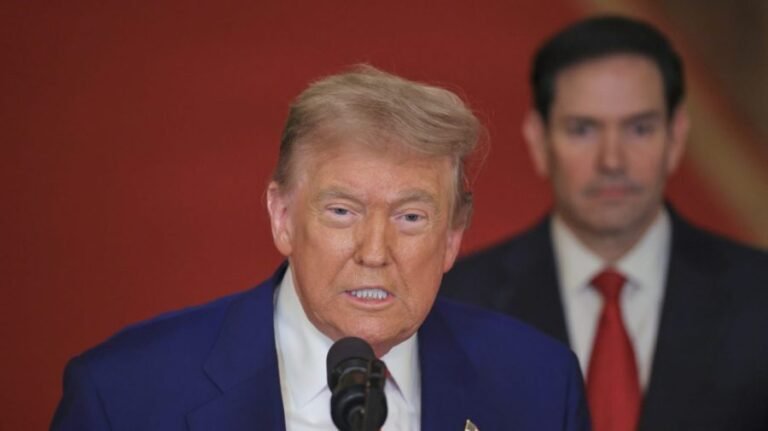
The White House is increasing its attacks on the judicial branch in the wake of decisions that briefly blocked President Trump’s sweeping tariffs.
It’s a battle-tested playbook the administration has used before on a number of fronts with the courts, which have emerged as an even greater bulwark to the president’s policies in his second term, especially with a GOP Congress that has largely left him unchallenged.
At the same time, the Trump team’s verbal attacks on the judiciary are more intense than any other administration in recent U.S. history, and underscore the public relations battle the White House is engaging in.
That battle is intended to rile up Trump’s base, while also pressuring his opponents and the courts.
Deputy chief of staff Stephen Miller decried a three-judge panel’s ruling that initially halted Trump’s sweeping “reciprocal” tariffs as “judicial tyranny.”
White House press secretary Karoline Leavitt called it part of a “troubling and dangerous trend of unelected judges inserting themselves into the presidential decision-making process.”
National Economic Council Director Kevin Hassett, a typically mild-mannered adviser, attacked the panel as “activist judges.”
It echoed the same rhetoric Miller, Leavitt and others have routinely used to push back on judicial rulings that block or undermine the administration’s agenda on immigration, efforts to shrink the government and more. It is also similar to the way Trump attacked judges who handled his legal cases before he won a second term.
The tactic serves the White House’s goals on multiple fronts. It allows officials to go on offense, where they are most comfortable. It also provides fodder to Trump’s MAGA base, creating a common opponent at a time when Democrats are out of power and largely helpless to impede the president’s agenda.
The strategy has been cause for alarm for Democrats and experts who have voiced concerns about the long-term impact of attacks on the courts.
“Courts upholding the rule of law is what separates America from dictatorships around the world. We are not ruled by kings, but by laws,” Skye Perryman, president of left-leaning legal group Democracy Forward, posted on the social platform X. “Intimidation of courts and ignoring the rule of the law betrays these values.”
The three-judge panel on the U.S. Court of International ruled on Wednesday to block Trump’s April 2 “Liberation Day” tariffs, which placed a 10 percent levy on all imports along with higher “reciprocal” tariffs for dozens of countries that could go into effect over the summer.
The ruling also blocked earlier orders that imposed tariffs on Canada, Mexico and China. Many had already been adjusted or delayed as stocks fell, and Treasury yields rose in the wake of Trump’s trade shifts.
An appeals court temporarily lifted the block in a ruling on Thursday.
But in the 24 hours in between, Trump allies went to work attacking the trade court and portraying it as the latest instance of judges deliberately undermining the president. The attacks came despite the fact that one of the judges who presided over the tariffs case was appointed by Trump.
Leavitt devoted the start of her briefing with reporters on Thursday to bashing the decision. She argued Trump was on sound legal footing and was being undermined by judges who “brazenly abused their judicial power.”
Jason Miller, a former senior adviser on the Trump campaign, claimed the trade court’s ruling showed a brewing battle “between American sovereignty and having a globalist takeover.”
After an appeals court temporarily reversed the trade court’s ruling, the target shifted slightly to the conservative group the Federalist Society and its longtime leader, Leonard Leo, who played a central role in shaping Trump’s judicial picks during his first term.
“I am so disappointed in The Federalist Society because of the bad advice they gave me on numerous Judicial Nominations,” Trump wrote Thursday. “This is something that cannot be forgotten! With all of that being said, I am very proud of many of our picks, but very disappointed in others.”
Alex Brusewitz, a GOP digital strategist and Trump adviser, called the Federalist Society “anti-MAGA.”
The barrage of attacks on the trade court followed a well-worn strategy Trump and his allies have used to try to shake confidence in judges and the court system.
Dating back to his first campaign in 2016, Trump questioned whether one judge was biased against him because of their Mexican heritage.
During the 2024 campaign, Trump relentlessly attacked the judge overseeing his hush money trial, comparing him to “a devil” in remarks after the case concluded with Trump being found guilty on 34 felony counts.
Critics argue that the attacks from Trump and his allies are not only harmful, but also ignore context about who is ruling against the president.
Rep. Jamie Raskin (D-Md.), the top Democrat on the House Judiciary Committee, noted the federal judges who have issued court orders blocking or pausing the Trump administration’s actions thus far have been appointed by five presidents.
“Trump keeps taking executive actions that blatantly, flagrantly exceed his authorities under the law and the Constitution. And he keeps losing in court, regardless of WHO appointed the judges. (Some of them were HIS.),” David Axelrod, an official in former President Obama’s administration, posted on X. “Yet he and his apparatchiks call it a ‘judicial coup.’”
But the attacks are part of a hardened outlook among Trump and some of his closest advisers that judges across the country are attempting to run out the clock on his second term by issuing injunctions and rulings that halt his agenda.
“That is the crisis in the courts,” said one White House official. “The president is elected to a four-year term, and it should not be possible for a dozen district court judges to grind down that term to prevent the president from doing what he campaigned on.”


